Related Research Articles

Brigitte Horney was a German theatre and film actress. Best remembered was her role as Empress Katherine the Great in the 1943 version of the UFA film version of Baron Münchhausen, directed by Josef von Báky, with Hans Albers in the title role.
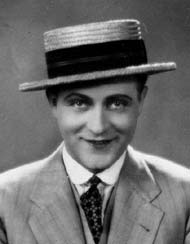
Willy Fritsch was a German theater and film actor, a popular leading man and character actor from the silent-film era to the early 1960s.
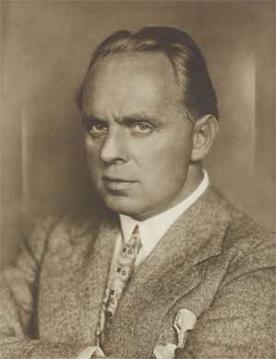
Friedrich Rudolf Klein, better known as Rudolf Klein-Rogge, was a German film actor, best known for playing sinister figures in films in the 1920s and 1930s as well as being a mainstay in director Fritz Lang's Weimar-era films. He is probably best known in popular culture, particularly to English-speaking audiences, for playing the archetypal mad scientist role of C. A. Rotwang in Lang's Metropolis and as the criminal genius Doctor Mabuse. Klein-Rogge also appeared in several important French films in the late 1920s and early 1930s.
Paul Victor Ernst Dahlke was a German stage and film actor.
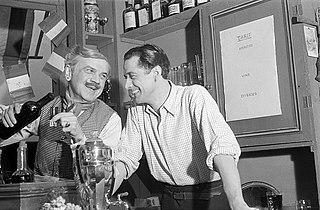
Hans Söhnker was a German film actor. He appeared in more than 100 films between 1933 and 1980. He was born in Kiel, Germany and died in West Berlin, West Germany.
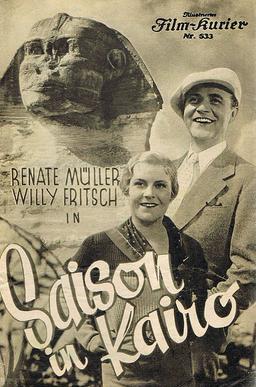
Season in Cairo is a 1933 German musical comedy film directed by Reinhold Schünzel and starring Renate Müller, Willy Fritsch and Gustav Waldau. A French-language version Idylle au Caire was released, also featuring Müller. The film's sets were designed by the art directors Robert Herlth and Walter Röhrig. It was shot on location in Egypt at Giza and Cairo, with interior filming taking place at the Babelsberg Studios in Berlin.
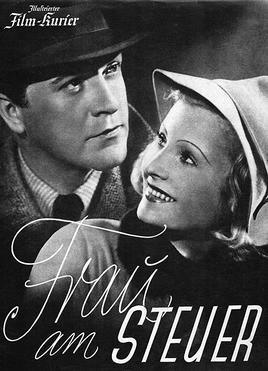
Woman at the Wheel is a 1939 German romantic comedy film directed by Paul Martin and starring Lilian Harvey, Willy Fritsch and Leo Slezak. It was the last German film featuring Harvey, who had been the leading box office star in Germany during the 1930s, although she made two further films after moving to France.

City of Anatol is a 1936 German drama film directed by Viktor Tourjansky and starring Gustav Fröhlich, Brigitte Horney and Fritz Kampers. It is based on a 1932 novel City of Anatol by Bernhard Kellermann. The film is set in a small city in the Balkans, where the discovery of oil leads to a major boom. It was shot at the Babelsberg Studios in Berlin with sets designed by the art directors Otto Hunte and Willy Schiller. A separate French language version Wells in Flames was made, also directed by Tourjansky but featuring a different cast.

Target in the Clouds is a 1939 German drama film directed by Wolfgang Liebeneiner and starring Albert Matterstock, Leny Marenbach and Brigitte Horney. It was based on a novel by Hans Rabl. The film portrays the struggles of the fictional German aviation pioneer Walter von Suhr, an officer in the pre-First World War German army who saw the potential for military aircraft.
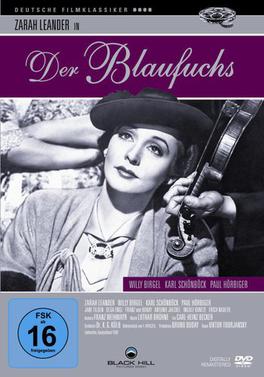
The Blue Fox is a 1938 German comedy film directed by Viktor Tourjansky and starring Zarah Leander, Willy Birgel and Paul Hörbiger. It was based on a play by the Hungarian writer Ferenc Herczeg. It includes the song Kann denn Liebe Sünde sein. It was shot at the Babelsberg Studios in Potsdam and on location in Budapest. The film's sets were designed by the art director Werner Schlichting.

I Need You is a 1944 German comedy film directed by Hans Schweikart and starring Marianne Hoppe, Willy Birgel and Paul Dahlke. The film's sets were designed by the art director Hans Sohnle.
Liberated Hands or Freed Hands is a 1939 German drama film directed by Hans Schweikart and starring Brigitte Horney, Olga Chekhova and Ewald Balser. It was screened at the 8th Venice International Film Festival. Horney plays a sculptor who discovers her true vocation.
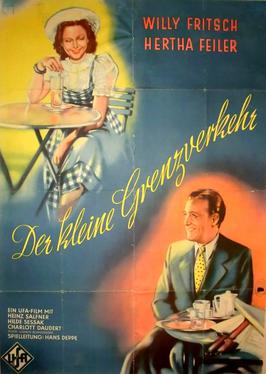
A Salzburg Comedy or Little Border Traffic is a 1943 German comedy film directed by Hans Deppe and starring Willy Fritsch, Hertha Feiler and Heinz Salfner. Erich Kästner wrote the screenplay based on one of his own novels. As he had been blacklisted by the Nazi Party, he used the pseudonym Berhold Bürger. The novel was again adapted for the 1957 film Salzburg Stories.
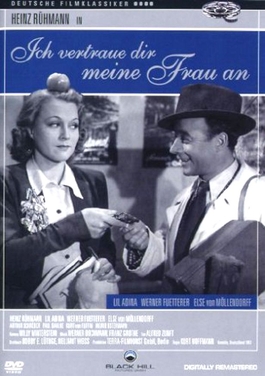
I Entrust My Wife to You is a 1943 German comedy film directed by Kurt Hoffmann and starring Heinz Rühmann, Adina Mandlová, and Werner Fuetterer. It was shot at the Babelsberg Studios in Berlin. The film's sets were designed by the art director Willi Herrmann.

The Day Before the Wedding is a 1952 West German comedy film directed by Rolf Thiele and starring Paul Dahlke, Elisabeth Müller, and Joachim Brennecke. It was shot at the Göttingen Studios. The film's sets were designed by the art director Walter Haag.

When the White Lilacs Bloom Again is a 1953 West German drama film directed by Hans Deppe and starring Willy Fritsch, Magda Schneider and Romy Schneider. It was shot at the Tempelhof Studios in West Berlin and on location around Wiesbaden in Hesse. The film's sets were designed by the art directors Alfred Bütow and Ernst Schomer.

In the Employ of the Secret Service is a 1931 German drama film directed by Gustav Ucicky and starring Brigitte Helm, Willy Fritsch, and Oskar Homolka. It concerns espionage between Germany and Russia during the First World War. It was made at the Babelsberg Studios in Berlin with sets designed by the art directors Robert Herlth and Walter Röhrig. Location shooting took place in Denmark.

The Governor is a 1939 German drama film directed by Viktor Tourjansky and starring Brigitte Horney, Willy Birgel and Hannelore Schroth. It is based on the play Die Fahne by Emmerich Groh. It was shot at the Babelsberg and Tempelhof Studios in Berlin and on location in East Prussia. The film's sets were designed by the art director Max Mellin. It was produced on a budget of 715,000 Reichsmarks.
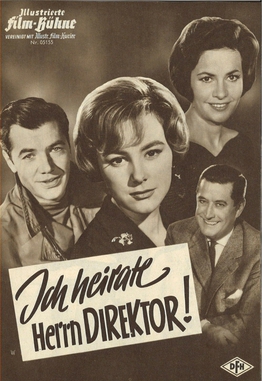
I'm Marrying the Director is a 1960 Austrian comedy film directed by Wolfgang Liebeneiner and starring Heidelinde Weis, Gerhard Riedmann and Hans Söhnker.
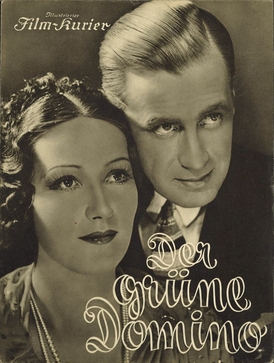
The Green Domino is a 1935 German mystery drama film directed by Herbert Selpin and starring Brigitte Horney, Karl Ludwig Diehl and Theodor Loos. It was shot at the Babelsberg Studios in Berlin and on location in Bavaria around Munich and the Tegernsee. The film's sets were designed by the art directors Otto Hunte and Willy Schiller. It is based on the novel Der Fall Claasen by Erich Ebermayer. A separate French-language version Le Domino vert was also produced, directed by Selpin and Henri Decoin but featuring a different cast.
References
- ↑ Hake p. 195